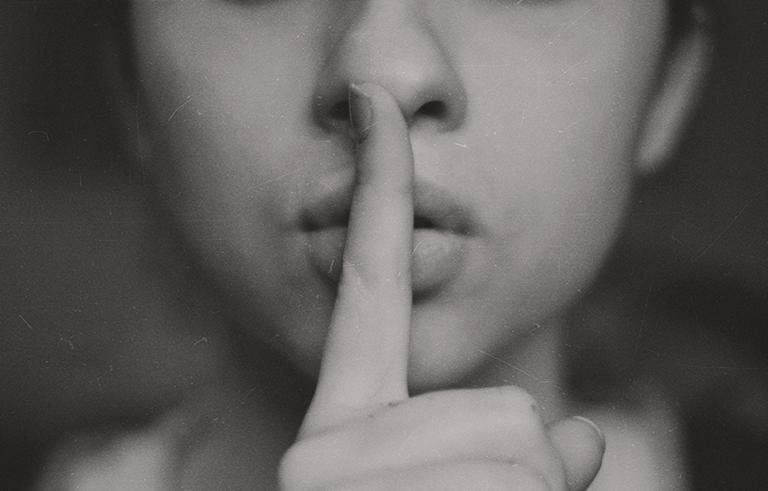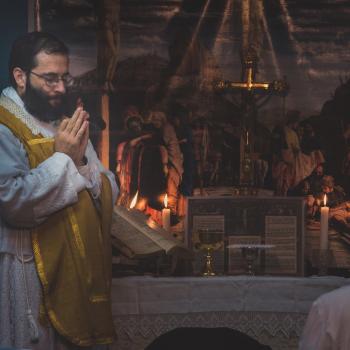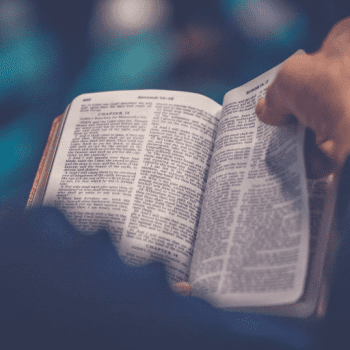
Too often, the modus operandi in the Church continues to be ignoring problems priests have. So often we look at them and assume as long as they aren’t minors or major PR disasters, we can ignore them. This silence is a disaster! When we ignore serious misconduct in other spheres, we keep these priests from getting help and we open up to ignoring bigger problems.
I want to go through two anonymous examples of priests I’ve spoken with who feel obliged to remain silent regarding other priests’ immoral acts. Also, between the two I ill quote two prominent priests who’ve written about the reasons that priests don’t talk about his.
Anonymous Priest on Homosexuality
A few months back, a priest contacted me with a tale of actively homosexual priests and further sexual misconduct by priests. He hoped I could get his words published but since he wanted no names or even dioceses included, what he said would remain rumors. I won’t publish such rumors. I will, however, post his options regarding this silence, remembering they are only opinions.
This Anonymous Testimony
This priest feels silence on this topic is his only option. He said, “I am not permitted to discuss the homosexual nature of these incidents.” And, he followed up, “I don’t know how I can get beyond this until clergy homosexuality is accepted as a legitimate topic for deliberation and effective resolution.”
Further, he noted:
I’d like to know. If homosexuality among priests isn’t a problem, then why can’t we discuss it? If bishops demand rational and charitable conversations, I agree with that. But if bishops across the land actively suppress conversations about one of the most obvious features of our present horror, then how will it ever be resolved? […]
In my opinion, no policies or task-forces will restore the credibility of Church leadership. This credibility will be restored only after priests no longer get away with sexual abuse and harassment, and after bishops no longer get away with covering it up (why weren’t the bishops who did this removed from office?), none of which will happen until the issue of homosexual clergy is effectively addressed. […]
The Catholic Church is my favorite thing in the world: it’s both the Bride of Christ and Christ’s gift to His Father. But we need to be open and honest about what’s been going on.
Silence on Homosexuality in the Priesthood
All this priest wants is a forum to discuss the topics. I concur on the need to discuss these topics. He has seen things far more than I have and feels restricted from talking about them. This is the opposite of my experience as I have no direct experience and feel comfortable talking about these topics.
My own provincial, Fr. John Connor, LC, wrote a letter to all Regnum Christi members on this situation. He stated, “Sins of sexual immorality, and in many cases homosexual immorality, are at the core of this crisis and they have taken a hold in the lives of some priests. This is unacceptable and incompatible with the chastity we priests promise publicly before God and his people on the day of ordination, and for religious priests well before then.”
Hence, admitting the homosexual aspect of the crisis is obviously permitted in my community. I count myself lucky in having the freedom to write on this.
Why Priests Don’t Come Forward
There are many reasons priests don’t come forward and keep silent these issues but forbidding the discussion just makes the scandal worse.
Fr. Dwight Longenecker and Fr. James Martin, SJ, have both mentioned related reasons that stories about McCarrick were hushed up. (Those aren’t two you’d generally have on the same side of a Catholic debate.)
Fr. Dwight Longenecker
After a long analogy with an unaccredited evangelical college that operates similarly to the priesthood, Longenecker notes:
It must be said, that those who were oppressed colluded with the system. For security, family reasons or whatever other motives good or ill, they agreed to be oppressed. They hunkered down. They played the game. They were silent. They weighed up the cost and reckoned that speaking up was not worth the price they would have to pay.
Some time ago, I was in a similar situation and discussed it with a friend who had also found himself tied into an abusive situation in his place of employment. He laughed and said, “You know what? You’ve got only three choices: 1. Tell them exactly what’s wrong. Shout it from the rooftops and demand change and prepare to be crucified 2. Smile, resign and walk away. 3. Accept your lot. Put up and shut up.”
Fr. James Martin, SJ
Fr. James Martin offers several reasons why priests and seminarians didn’t report McCarrick. Here, I’ll focus on the latter reasons as I see them more pertinent to this discussion:
Some of these former seminarians and young priests in these dioceses may still be in active pastoral ministry. Bringing up unsavory details about a powerful cleric may make them fear being seen as “trouble-makers” or “complainers” in their dioceses or among their brother priests. Cardinal McCarrick was also one of the most powerful men in the U.S. church, the bishop of one of the major sees in the universal church and a personal friend of several popes. What could saying something about him do to your career?
Likewise, many former seminarians might be hard to track down and want no part of the episode for the same reason: shame. The problem with reporting on this story, then, is twofold: the former seminarians may be hard to find and those who stayed are probably loath to discuss it.
Forbidding this to enter the conversation is likely to make the issues Longenecker and Martin spoke of worse. If we want to come clean as a Church, we need to be able to speak about the issues. There are issues of homosexuality, there are issues of misusing power, there are issues with a culture of silence. The first step in solving a problem is admitting you have a problem. We can only move forward to resolve the Church’s problems on this if we first acknowledge them.
Anonymous Priest on Other Misconduct
Another priest told me about a related Issue: Bishops’ inaction in general. The priest who wrote an anonymous article in Crisis contacted me about these issues. In his piece, he mentioned some cases of problem priests and he has told me about others.
In my years of priesthood I have learned what the greatest good is for a bishop: to address as few complaints as possible. So, if a priest is having a gay affair, if he has a serious drinking problem, if he is sleeping around with women, if it is clear that he has mental disorders that inhibit him from overseeing a parish, if he is wicked and cruel, if he regularly abuses the liturgy, if he preaches heresy, if he contradicts the bishop, or if he teaches counter to the moral teaching of the Church, as long as there is no traceable record of complaint, or continual outcry from the people, then all remains the same, as long as the sins remain mostly occult. If a bishop can legally turn a blind eye, he will. Because otherwise, he may have to do something unpleasant.
To some extent this intentional and willful ignorance is understandable. I think I know why these men act (or don’t act) as they do. Whenever a bishop takes action against a priest, there is outcry. Especially if it is a popular priest who preaches what people want to hear. I know of so many situations where a bishop has justifiably removed a priest, only to be met with a deafening, unyielding chorus of disapproval. Letters are written (both to the press and to the Nuncio). Petitions are signed. Websites are created. Tweets are formulated with trending hashtags. All detail the plight of a kind-hearted priest being persecuted by a malevolent bishop for no apparent reason. It has to hurt the morale of other priests trying to do the right thing. […]
If I may, I now speak for myself and my peers directly to the American prelates: Bishops, we can appreciate how you feel when attacked for doing what is right. We can appreciate the hurt, the desolation, and the immense loneliness. We can appreciate it, because we live it as well. We live it when we preach a homily defending the Church’s teaching on marriage, and are chastised by you for “upsetting the people.” We live it when we express how difficult it is to live with someone who drinks himself into a rage every night, and we are told by you that we need to “get along with our pastor.” […]
We live it when we see seminarians leave because a priest made an advance on them and you do nothing about it after we report it. We live it when our family and friends part ways with us because of Church abuse scandals. We live it when we are insulted in public. We know that it is difficult to do what is right in the current climate.
We often look to you, our spiritual fathers, for solidarity and support. We need someone to stand with us to be “shining lights in the midst of a crooked and perverse generation.”
I know the names and current ministries of both of the anonymous priests that I quote in this article and have made a reasonable effort to be sure they say they are who they claim to be. They are in different dioceses in different states. Neither diocese has been a focal point of recent news of priestly misconduct. They both reached out to me via social media.
Conclusion
I agree in general terms with the four priests I’ve quoted here. We cannot remain silent but need to work to clean up the situation of the Church. We must all be saints. The first step in resolving any problem is admitting it is a problem. The problem of silence about active homosexuality and other issues in the clergy is a problem we must admit in order to address.
Regarding the McCarrick scandal, Elizabeth Bruenig said, “You can make it all go away. Just tell the truth.” In order for us to tell the truth about other issues of priestly misconduct, we need to be able to speak about them. Let’s end this silence.
Become a Patron! (The best Christmas gift you can give me).
















